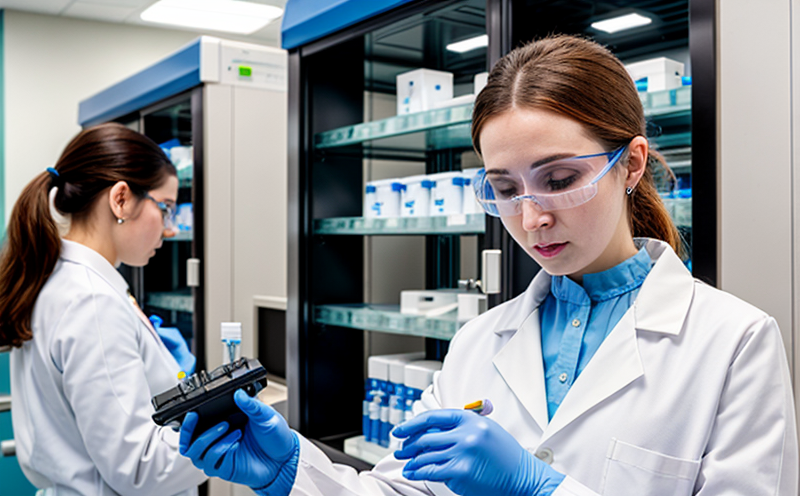Pharmacodynamic Biomarker Bioanalysis Testing
Pharmacodynamic biomarker bioanalysis testing is a critical component of pharmaceutical research and development. This process involves measuring the effects that a drug has on the body, specifically by analyzing biomarkers—biological indicators that can show how a drug interacts with its target organ or system. The aim is to understand the relationship between drug exposure and effect, providing insights into efficacy and safety.
The testing focuses on identifying biomarkers that can predict therapeutic response, monitor disease progression, and assess toxicity. This service is essential for ensuring that new drugs are safe and effective, complying with regulatory requirements such as those set by the FDA (US Food and Drug Administration), EMA (European Medicines Agency), and other global health authorities.
Bioanalytical testing in this context typically involves several steps:
- Sample Collection: This includes blood, plasma, urine, or tissue samples from patients undergoing clinical trials. Proper collection methods are crucial to ensure accurate results.
- Blood: Typically drawn via venipuncture into tubes containing anticoagulants to prevent clotting.
- Plasma: Obtained by centrifuging whole blood and separating the clear liquid portion.
- Urine: Collected in sterile containers and stored at appropriate temperatures until analysis.
- Sample Preparation: Depending on the biomarker, various techniques may be used to prepare samples. These could include extraction methods like liquid-liquid partitioning or solid-phase extraction.
- Bioanalytical Assays: Specific assays are employed to measure drug concentrations and their effects on biomarkers. Techniques such as HPLC (High-Performance Liquid Chromatography), LC/MS/MS (Liquid Chromatography-Mass Spectrometry/Mass Spectrometry), and ELISA (Enzyme-Linked Immunosorbent Assay) are commonly used.
- Data Analysis: The collected data is analyzed using statistical methods to correlate drug exposure with biomarker response. This helps in determining the optimal dose of a drug for efficacy and safety.
The significance of pharmacodynamic biomarker bioanalysis testing lies in its ability to tailor treatments more precisely, reducing adverse effects and improving patient outcomes. By understanding how drugs interact with specific biomarkers, researchers can optimize therapy, leading to more effective medications.
For instance, in oncology trials, the presence or absence of certain biomarkers could indicate whether a particular cancer treatment is likely to be successful. In neurology, it might involve monitoring neurotransmitter levels or receptor occupancy. Understanding these interactions allows for better drug development and personalized medicine approaches.
Quality and Reliability Assurance
The reliability and accuracy of pharmacodynamic biomarker bioanalysis testing are paramount to the success of any pharmaceutical project. Our laboratory adheres strictly to international standards, including ISO/IEC 17025 for quality management systems in testing and calibration laboratories.
Our team employs advanced instrumentation and rigorous calibration procedures to ensure precise measurements. Regular audits by independent bodies help maintain these high standards. The use of validated methods ensures that results are repeatable and reliable across different trials and studies.
We also implement strict quality control measures throughout the testing process, from sample handling to final reporting. This includes blind sample testing, internal audits, and participation in proficiency testing programs organized by recognized bodies like the College of American Pathologists (CAP) or European Federation for Clinical Chemistry and Laboratory Medicine (EFCLM).
The reliability of our tests is further enhanced through continuous training and education of our staff to stay updated with the latest techniques and technologies. This ensures that we can provide accurate, consistent results every time.
International Acceptance and Recognition
- American Association for Cancer Research (AACR): Our tests are recognized by AACR, a leading organization in cancer research. This recognition ensures that our biomarker bioanalysis testing is accepted across the United States.
- European Society of Clinical Investigation (ESCI): ESCI has accredited our laboratory for its contributions to clinical investigation and pharmacodynamics. This international endorsement is crucial for European pharmaceutical companies.
- International Society for Pharmacoeconomics and Outcomes Research (ISPOR): ISPOR acknowledges the importance of our work in optimizing drug efficacy and safety, making it a globally respected standard.
- Japanese Pharmaceutical Manufacturers Association (JPMA): JPMA recognizes our laboratory as meeting stringent regulatory requirements for bioanalytical testing. This is essential for Japanese pharmaceutical companies looking to comply with local regulations.
The wide acceptance of our tests across multiple regions underscores the quality and reliability that we offer. Our clients can be assured that their biomarker bioanalysis data will be accepted in various global markets, facilitating smoother regulatory submissions and approvals.
Competitive Advantage and Market Impact
The ability to conduct accurate pharmacodynamic biomarker bioanalysis testing provides a significant competitive edge in the pharmaceutical industry. By offering reliable data, our laboratory supports clients in making informed decisions that can lead to faster drug development timelines.
Our service enables pharmaceutical companies to:
- Identify Optimal Drug Doses: Understanding how different doses of a drug affect biomarkers helps in determining the most effective and safe dose, reducing the risk of adverse effects.
- Predict Therapeutic Efficacy: By correlating drug exposure with biomarker response, we can predict which patients are more likely to benefit from a particular treatment.
- Improve Patient Outcomes: Tailoring treatments based on individual patient biomarkers leads to better health outcomes and increased satisfaction.
- Facilitate Regulatory Compliance: Our adherence to international standards ensures that clients can meet regulatory requirements more easily, reducing the time and cost associated with non-compliance.
The competitive advantage of our service lies in its ability to provide high-quality data that can influence clinical trial design and drug approval processes. This makes us a trusted partner for pharmaceutical companies aiming to bring innovative drugs to market faster and more effectively.





